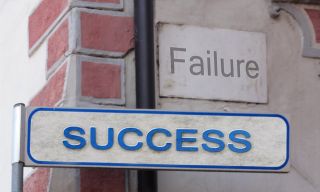Dreaming
Does Success Breed Success?
What happened when researchers bestowed success randomly?
Posted May 9, 2014

"We often see people experience strings of success, one after the other, while we see other, seemingly similar individuals fail to experience even a single success," says sociologist Arnout van de Rijt of SUNY Stony Brook, NY. That observation tempts us to suspect that success breeds success, i. e. that a "lucky break" can set in motion what van de Rijt calls a success cascade. But that hypothesis is hard to test in a scientific way because other factors—such as special talents and networks of supportive contacts--are important to success, too.
Despite the difficulty, van de Rijt and his research team set out to determine whether success breeds success, using a novel experimental design and the power of the Internet. In each of four online forums, the researchers randomly selected 200-500 individuals or projects and either contributed funding for a proposed project, provided an endorsement of an individual’s professional work, gave an award for dedication to a community group, or provided signatures in a social or political campaign. The random selection was important. No judgment of merit or value was made in granting the success or recognition.
In all scenarios, individuals given early support were 9 percent to 31percent more likely than individuals who did not receive early support to receive follow-up support from other individuals.

In all scenarios, individuals given early support were 9 percent to 31percent more likely than individuals who did not receive early support to receive follow-up support from other individuals.
Although impressive and significant, the effect was found only for initial success and not for subsequent, added successes. In other words, larger numbers of bestowed successes did not proportionally increase the level of later success, suggesting that a single initial success may be sufficient to trigger a self-propelling cascade of success.

Arnout van de Rijt
"Our experiments show that two individuals can be equally motivated to succeed, equally talented, equally well-positioned. And yet one of them may get a lucky head start over the other, and this advantage may then beget further advantage, producing an arbitrary and growing disparity in success between the two," he says.
Van de Rijt believes his work suggests some practical applications in the real world of philanthropy and social change. "For philanthropists, our results show that the first success is most instrumental in breeding further success. This suggests that instead of making a large donation to a single cause, one may be able to do more good by splitting that large dollar amount into smaller chunks to be distributed across multiple beneficiaries, who all may experience the positive feedback effects of that early success," he says. "For those campaigning for money or signatures, the study suggests that it is important to gather some initial support, which will likely help jumpstart further support."
For More Information
Arnout van de Rijt, Soong Moon Kang, Michael Restivo, and Akshay Patil. Field experiments of success-breeds-success dynamics. PNAS Early Edition Published online before print on April 28, 2014.


